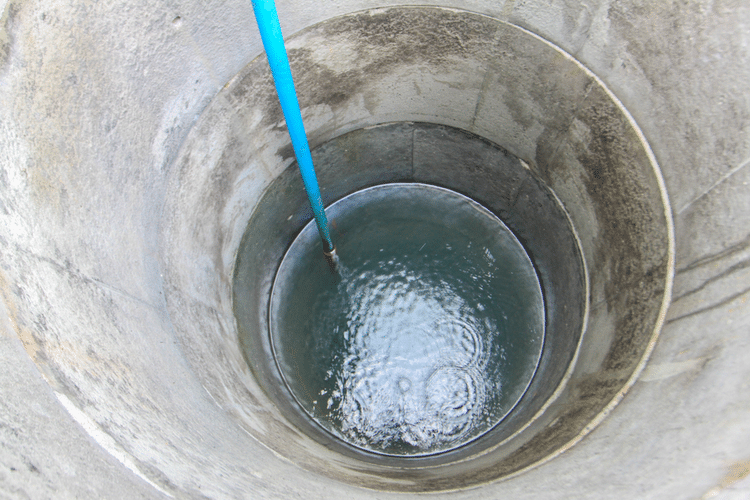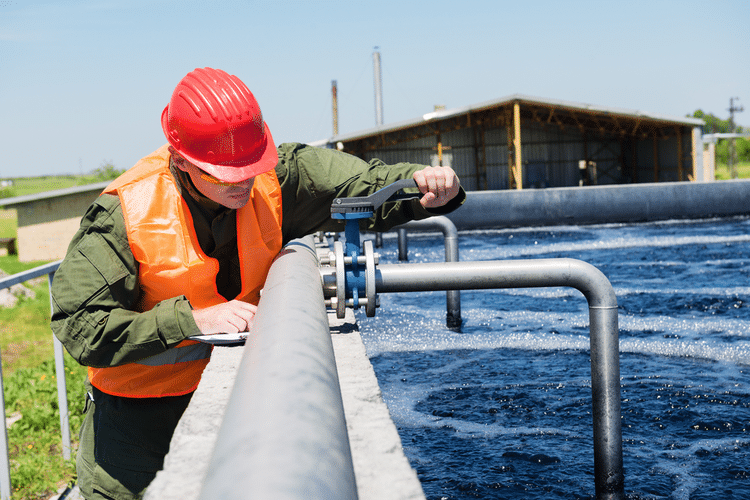Well water, also referred to as groundwater, is mostly used in rural areas, and well owners are responsible for the water quality. City water or tap water, on the other hand, is treated and distributed by the water authority or local government agencies.
The difference in the supply and delivery methods between the two also indicates a potential difference in water quality and the overall cost of having access to water. Let’s see what these differences are in more detail.
The Difference Between Well Water and City Water
The main difference between city water and well water is that city water is treated and distributed by municipal water authorities, while well water is comes from underground aquifers on a residential property.
However, the fact that it’s free of disinfecting chemicals doesn’t necessarily imply that well water is less contaminated. Depending on its location, the character of the surface minerals that leaks into it, its proximity to pesticides and herbicides, and how well it’s taken care of, a well may contain sediments, bacteria, and naturally occurring contaminants like iron.
Moreover, the installation and maintenance of wells are the responsibility of the owners. This means that, as a well owner, you need to pay the necessary usage and maintenance fees, and the quality of your water relies on how well you take care of it.
On the other hand, city water is the water suppliers’ responsibility. The suppliers are responsible for maintaining the system and ensuring quality water, while the consumers are obligated to pay monthly utility bills.
Is Well Water Better than City Water?
People who distrust corporations or the authorities may think that well water is better since the well-owner has total control over it. However, many factors can affect the water quality of both sources, so there’s no guarantee that wells will produce better and healthier water than city water.

For example, the water crisis in Flint, Michigan that happened in 2014 shows that a city water disaster can be capable of harming an entire community. In this example, a simple change in the municipal water source of the city of Flint put the lives of thousands in danger.
But well water isn’t a perfect solution either. Many people in the rural US are also exposed to contaminated water due to improper industrial dumps and agricultural practices that pollute groundwater. Therefore, it’s imperative for well-owners to remain diligent and test their water source for pathogens and pollutants at least annually, as recommended by the CDC (Centers for Disease Control and Prevention).
Some locations don’t have quality underground water; in some places, the streams of water running below ground, known as aquifers, may also be contaminated. Even though the water you receive in your home smells and tastes fine, test results may show the presence of invisible contaminants.
If the presence of these contaminants reaches dangerous levels, it’s best to proceed with caution and remove contaminants.
Causes of Well Water Contamination:
- Animal waste from livestock yards, silos, septic leach fields (closer than 50 feet)
- Petroleum tanks, fertilizer storage, liquid manure (less than 100 feet from the well)
- Manure piles (less than 250 feet from a water source)
- Oil and gasoline drilling within aquifer bed
Causes of City Water Contamination:
- Naturally occurring toxins like radon, arsenic, uranium
- Land use practices from nearby industries
- Antiquated water lines (lead)
- Outbreaks of Giardia, Legionella, Norovirus, Salmonella, Hepatitis A (complete list)
Do You Pay For Well Water?
In order to drill a well, you will need to hire a professional well service company and you may also have to pay for water filters to keep the water clear from contaminants. Depending on the width and depth of the well, you should expect to pay between $4,000-$15,000 for the initial construction.
While you may choose to pay $300-$500 for point-of-use reverse osmosis systems, the price of whole house well water filtration systems can reach as much as $5,000 depending on the brand and model. Moreover, if the water is hard, you will also need to purchase a well water softener system to remove the hard water minerals. These units cost $300-$1,500.
The electricity costs of operating a household well are negligible. An average pump will require 1 kilowatt of energy per hour (kWh), and it can produce 10 gallons of water per minute, which equals 600 gallons in an hour. Considering that 1 kWh is roughly equal to $0.15 (as of 2022), you’ll have 600 gallons of water for that price.
Do You Pay For City Water?
Yes, you pay for city water because it is delivered to homes from water treatment facilities through a network of underground pipes, and regulating authorities manage city water infrastructure, maintenance, treatment, and delivery. Therefore, water consumption is part of our monthly utility charges.
According to the EPA, an average American household uses more than 300 gallons of water daily. Although water prices differ depending on the state and supplier, with an average rate of 4-5 dollars per 1,000 gallons, an average household pays $45-$60 in water bills every month.
In addition, some water jurisdictions rely on increasing or declining block rates, while other regions may use seasonal, drought, and water budget rates. This can affect your monthly water bill.
Pros & Cons of Well Water
The pros and cons of well water are sometimes personal or stem from unfounded opinions. Here’s a tabular comparison:
| Well Water Pros | Well Water Cons |
|---|---|
| No monthly water bill regardless of how much you use (but overuse may drain a well) | The initial cost of well installment |
| No chemical additives like chlorine | Water quality and testing are well owners’ responsibility |
| It may taste fresher and has nutritional benefits (subject to water quality) | Requires electricity for pump (use solar or generator power) |
| Outside climate factors like natural disasters do not influence the continuous water supply unless the well is affected | It may contain naturally occurring minerals that stain the water |
Pros & Cons of City Water
| City Water Pros | City Water Cons |
|---|---|
| Governing authority is responsible for water purity, quantity, and delivery. | It contains chemicals like chlorine, fluoride, & others and is stored in tanks |
| Access for many city and suburban residents | Shared with thousands, and a third party manages the supply |
| Banks and mortgage companies consider city water a better option when negotiating mortgages | Costs of water and administrative expenses are rising |
| Possible considerable scale contamination (natural disasters or equipment failure) |
How to Get City Water Instead of Well
You can choose to ditch your well and switch to city water, but only if there’s already a pipeline on your street or a transient non-community water station (TNCWS) nearby.

If there’s a pipeline, you need to contact the public water supplier and apply to be connected to the public water system. If your house doesn’t have the necessary infrastructure, you will have to pay extra to connect to the main water supply. The costs depend on the state you’re in, how much piping and plumbing needs to be done, and the quality of the materials, but you can expect an expenditure between $3,000-$5,000.
Hauling city water from a nearby source, on the other hand, requires a sizeable water tank and means of transportation. Considering that a 5,000-gallon tank costs between $4,000-$5,000 and the fluctuating nature of oil prices, this technique might become quite costly in the long run.
Can You Have Both Well and City Water?
Having both well and city water is possible, but it depends on where you live and local regulations.
City water isn’t an option for those living in rural acreages, off-grid, or on farms either due to costs or inaccessibility. Also, some water municipalities may not allow you to use city and well water simultaneously. We advise you to consult local authorities if you plan to use both well and city water.
Conclusion
Well water is entirely under your control, and it’s free of chemicals that are used to disinfect city water. However, well water can still get contaminated, sometimes even more so than city water, due to various reasons, including industrial and agricultural waste.
City water is constantly treated and maintained by the supplier and local authorities, but it doesn’t mean water quality is guaranteed. You also have to pay a considerable sum every month.
You don’t pay bills for well water, but you pay the construction and maintenance costs.
If you have a well but want to switch to the public system, it’s possible as long as there’s already a public pipeline or TNCWS nearby. The cost of switching to tap water depends on the water infrastructure of your house.
I loved that you mentioned that a home water well doesn’t have a water bill at all! I’ve been contemplating investing in a water well for over a year now. It would be really nice to talk with a water company to see what it would cost.
I have had a well since I was born. I don’t want to pay for something that is free. Also think of Flint and how those people were made sick and done died. The government controls the water as well as what’s in it. All those chemicals are not good for you. Well water tests are very cheap and I have mine checked every other year. So far it’s fine
I loved how you said that you won’t have to worry about chemicals being added to your water if you have a well! My husband was talking to me a couple of weeks ago about how he thinks it would be a good idea for us to get a well drilled on our property, so I wanted to learn more about the advantages. I appreciate you helping me learn more about the benefits of well water!